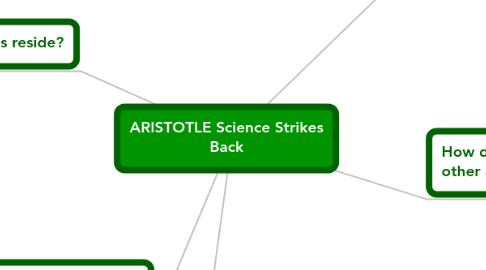ARISTOTLE Science Strikes Back
作者:Emma Wolgast


1. How does Aristotle differ from Socrates or Plato?
1.1. Aristotle is a scientific and practical thinker
1.2. He does not believe in forms, but thinks everything we can understand are things we can touch
1.3. Applies a scientific model to philosophical investigation
2. What is a teleological system?
2.1. Believed that everything in this world has causes
2.1.1. Material Cause: the material from which the thing is made
2.1.2. Formal Cause: the shape or form a thing must take in order to be recognized
2.1.3. Efficient cause: the actual force used to make thing
2.1.4. Final Cause: what is the ultimate purpose of the thing
3. Where do the forms reside?
3.1. Aristotle believes the forms are inside things themselves
3.2. Example: the form of the Oak Tree is inside of the acorn
3.3. Each thing that we see is part of the teleological (goal oriented) system
4. Aristotle's Biology
4.1. "All men by nature desire to know. An example is the delight we take in our senses."
4.2. Believes nothing is by chance, and that our senses were given so we can understand the world.
4.3. To engage the problem, we must begin with our senses.
5. How do our senses differ from other animals?
5.1. All forms of life have nutritive, reproductive and locomotive power
5.2. More complex animals have intelligence
5.3. Humans have an intellectual power: reason.
5.3.1. Gives us the ability to comprehend universals
